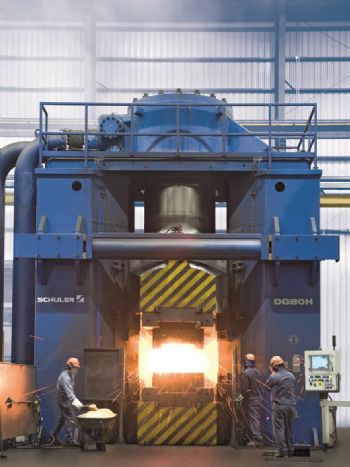 Pictured right: robust, reliable, and precise: Bêché counterblow hammers are currently in high demand. Photo: Schuler
Pictured right: robust, reliable, and precise: Bêché counterblow hammers are currently in high demand. Photo: SchulerLarge forged parts continue to be in high demand worldwide: the Göppingen-based machine manufacturer
Schuler has recently sold four Bêché counterblow hammers of different sizes. The applications for forged parts are diverse and extend far beyond the the drive trains of trucks or ships — products manufactured with the counterblow hammers include parts for the oil and gas industry, the rail sector, as well as flanges or turbine blades for gas turbines or aircraft.
Daniel Sauterleute, sales manager forging technology at Schuler, a world market leader in forming technology, explained: “Our machines handle such challenging tasks with high repeat accuracy. This also allows smaller batch sizes to be produced economically.”
The range of Schuer counterblow hammers extends from small models like the DG 20 to the DG 140 with a working capacity of up to 1,400kJ. The DG 20 offers a stroke per ram of 840mm and achieves a maximum blow frequency of up to 45 per min, while the DG 140 has a striking force of 54,000 tonnes, a stroke per ram of up to 1,150mm, and a maximum blow frequency of up to 25 per min.
The counterblow hammers are available in two series, HG and DG. The difference lies in the drive technology — the HG series, which is particularly suitable for the medium performance range, features a hydraulic drive. The DG series relies on the proven pneumatic drive, which enables the realisation of very large forming energies. The stable frame design in combination with a massive guidance system ensures high precision in forging operations.
In addition, simulations can help customers optimise the forging process. Schuler has also developed a variety of solutions for networking forming technology, which increase productivity and availability. These include applications for monitoring operating conditions, press force, energy requirements, as well as cooling and lubrication circuits, ‘Track & Trace’ for tracking components, or ‘Schuler Connect’ for quick assistance in service cases using augmented reality (AR) technology.